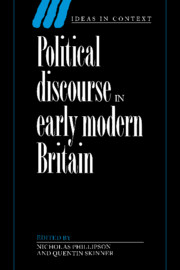Book contents
- Frontmatter
- Contents
- Contributors
- Preface
- PART I
- PART II
- PART III
- PART IV
- 13 Shaftesbury, politeness and the politics of religion
- 14 Propriety, property and prudence: David Hume and the defence of the Revolution
- 15 The rhapsody of public debt: David Hume and voluntary state bankruptcy
- 16 Universal monarchy and the liberties of Europe: David Hume's critique of an English Whig doctrine
- PART V
- A bibliography of the writings of J. G. A. POCOCK
- Index
- Ideas in Context
15 - The rhapsody of public debt: David Hume and voluntary state bankruptcy
Published online by Cambridge University Press: 07 May 2010
- Frontmatter
- Contents
- Contributors
- Preface
- PART I
- PART II
- PART III
- PART IV
- 13 Shaftesbury, politeness and the politics of religion
- 14 Propriety, property and prudence: David Hume and the defence of the Revolution
- 15 The rhapsody of public debt: David Hume and voluntary state bankruptcy
- 16 Universal monarchy and the liberties of Europe: David Hume's critique of an English Whig doctrine
- PART V
- A bibliography of the writings of J. G. A. POCOCK
- Index
- Ideas in Context
Summary
I do not blame anyone if political evils make him begin to despair of the welfare and progress of mankind. But I have confidence in the heroic medicine to which Hume refers, for it ought to produce a speedy cure.
Immanuel Kant, 1798In his political discourse ‘Of Public Credit’, first published in 1752, David Hume delivered a judgement striking in its menace and severity: ‘either the nation must destroy public credit, or public credit will destroy the nation’. What did he mean?
In John Pocock's suggestive and elegant argument, his judgement was an expression of an inescapable ambivalence in Hume's vision of commercial modernity. For Hume commerce was an essentially positive agency in world history, the handmaid of modern liberty and source of modern civilisation. Pocock suggests that in the Humean macrocosm commerce was to modern politics what, in Montesquieu's language, virtue was to republics: its ‘principle’. As it was the ‘inner meaning of the republican thesis that virtue must sustain the conditions necessary to virtue’, commerce, in order to carry the weight heaped on it by Hume's theory of modernity, had to have the same self-preserving qualities. Tragically, as Hume himself realised (Pocock tells us), this was not the case, for commerce met its nemesis in the public debt. An agent of thoroughgoing corrosive power, public debt was created by the commerce it would eventually destroy.
Although on Pocock's account public credit and the expansion of trade are ‘logically separable’, he reads Hume's essay as conjuring up ‘a vivid image of a society destroying itself by heaping up the public indebtedness to the point where trade and agriculture were both brought to ruin’.
- Type
- Chapter
- Information
- Political Discourse in Early Modern Britain , pp. 321 - 348Publisher: Cambridge University PressPrint publication year: 1993
- 26
- Cited by

